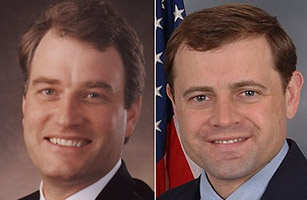
Virginia Republican Robert Hurt, left, and Democrat Tom Perriello
In 2008, no one saw Tom Perriello coming. Running an idealistic campaign against a six-term incumbent, the political novice eked out a stunning upset in Virginia's 5th Congressional District, beating Republican Virgil Goode by just 727 ballots in a region even Barack Obama failed to capture in his historic Potomac sweep. Two years and more than a thousand votes in Congress later, the freshman Democrat is once again in the race of a lifetime.
State senator Robert Hurt, the Republican challenging Perriello, is essentially marketing himself as a foil to Washington Democrats. Through public appearances, press releases and advertising, Hurt has been telling voters that his opponent's support for liberal causes such as union card check and carbon cap-and-trade just doesn't jibe with the staid values of the 5th District, which stretches from Danville and its surrounding counties along the southern Virginia border up to Charlottesville, some 130 miles (about 210 km) to the north. Hurt constantly invokes the Speaker of the House, dubbing every bill "the Pelosi-Perriello health care plan" or the "Pelosi-Perriello stimulus" with alliterative acrimony.
While casting him as a primary engine of the 111th Congress's legislative agenda is beyond hyperbolic, Perriello has been a staunch Democratic vote for much of the past two years. Unlike other freshman Dems from conservative bastions that flipped in '08 — such as Blue Dog Glenn Nye, from Virginia's 2nd District — he didn't defect on the major issues Hurt is so quick to bring up. When Perriello did buck his party, it was not a simple feint to the center. Perriello practices his own brand of raw economic populism; he opposed the Dodd-Frank financial-regulatory-reform bill for not going far enough to restrain the banking sector, and he recently called on President Obama to fire Treasury Secretary Timothy Geithner for, in his eyes, coddling Wall Street and China.
As other vulnerable Dems have clammed up about their toughest votes, Perriello has gone to great lengths to talk to disgruntled constituents about what he has done in Washington. He held more town-hall meetings in 2009 than any other member of Congress, and his first re-election TV ad was all about in-district jobs created under the American Recovery and Reinvestment Act. But it's a tough sell. Despite the stimulus dollars, Danville's unemployment rate has hovered near 12% for much of this year, and southern Virginia has been incredibly hard-hit by the recession. Though cap-and-trade never made it into law, the mere mention of an energy tax sparks outrage in the Old Dominion, where high utility rates have long been a touchy subject.
Just how endangered Perriello really is remains a matter of debate. A few public surveys have shown Hurt leading by more than 20 points, but internal campaign polls and the predictions of professional prognosticators suggest a much tighter contest. "It's very close," says Isaac Wood, a political analyst at the University of Virginia's Center for Politics. "There might be a slight edge for Hurt." There is an independent candidate on the ballot this year in would-be grass-roots conservative Jeff Clark, but his meager fundraising and consistent single-digit presence in the polls have largely removed him from the picture. However, Hurt is worried enough about splitting some of his vote that he has declined to appear in forums with Clark, and televised debates scheduled for October are expected to only include the Democrat and the Republican.
Though Hurt has this cycle's throw-the-bums-out sentiment at his back, he is not in the best possible position to exploit it. The experienced state legislator emerged from a crowded, Tea Party–packed primary field as the safe but unexciting Establishment pick. Perriello's unapologetic liberalism has won him a loyal cadre of youthful supporters that could turn the tide of enthusiasm in his favor. And the geographic concentration of his base around the university town of Charlottesville makes it easier for that base to organize than his opponent's diffuse, rural network in a district larger than New Jersey.
Another challenge for Hurt lies in the lack of a campaign blueprint he can easily import from recent races. Virgil Goode was a one-man political machine who won re-election at one time or another as a Democrat, independent and Republican, often through sheer force of personality, leaving Hurt with little or no political machinery to rebuild.
In the end, the deciding factor in the race may be the air war. The 5th District is not an expensive media market, and a deluge of television advertising is well under way. Although Perriello enjoyed a huge cash advantage that enabled him to get on TV before his rival, there are indications that Hurt's coffers are beginning to swell, and independent expenditure groups have begun dropping serious money on the race. The National Republican Congressional Committee is running ads on Hurt's behalf, and Americans for Prosperity, a conservative 501(c)4 advocacy organization, has been on the air castigating Perriello for his health reform vote all year. More groups are expected to join the fray as Election Day draws near.
Wood remembers 2008 as the year that everyone underestimated Tom Perriello and dismissed the chances of a November nail biter. "Nobody was calling, nobody was looking at this race," he says. "This time, everybody sees it coming."